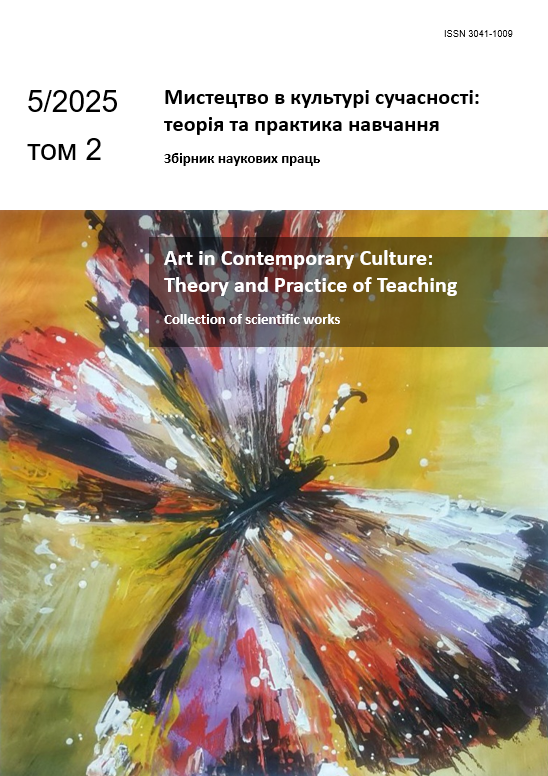Articles
THE INFLUENCE OF MUSICAL ACCOMPANIMENT ON THE PSYCHO-VEGETATIVE STATUS AND EMOTIONAL WELL-BEING OF A PERSON IN A SITUATION OF UNCERTAINTY
Published 2025-12-15
Keywords
- psycho-vegetative status,
- emotional well-being,
- physiological well-being,
- stress,
- traumatic experiences
- autonomic nervous system,
- stress reactions,
- psychophysiological disorders,
- autonomic dysfunction,
- rehabilitation,
- psychological health,
- body functioning ...More
Copyright (c) 2025 Інесса Візнюк

This work is licensed under a Creative Commons Attribution 4.0 International License.
How to Cite
THE INFLUENCE OF MUSICAL ACCOMPANIMENT ON THE PSYCHO-VEGETATIVE STATUS AND EMOTIONAL WELL-BEING OF A PERSON IN A SITUATION OF UNCERTAINTY. (2025). Art in Contemporary Culture: Theory and Practice of Teaching, 6, 78-86. https://doi.org/10.31652/3041-1017-2025(5-2)-26
Abstract
The article deals with the influence of psychovegetative status on the emotional and physiological well-being of a person under stress and traumatic experiences. The research aimed at studying the functional-vegetative status as a factor of human life support, as well as identifying autonomic dysfunction syndromes (ADS) is described. It is determined that psycho-emotional factors significantly affect the functioning of the autonomic nervous system, which in turn affects the emotional and physiological state of a person under constant stress. The study was conducted in accordance with ethical standards with the same measuring materials and conditions for all participants in the experiment. The article examines the influence of psycho-vegetative status on the emotional and physiological well-being of a person under stress and traumatic experiences. The author describes how psycho-emotional factors can change the functioning of the autonomic nervous system, which in turn affects the general state of health, emotional stability and physiological reactions of the body. The mechanisms of development of stress reactions and their relationship with functional and vegetative disorders are studied. It is emphasised that disorders of autonomic regulation can lead to various physiological disorders and deterioration of the psycho-emotional state of a person, in particular, in conditions of prolonged stressful situations or after traumatic events. The importance of monitoring the psycho-vegetative status for early detection of potential disorders and improving the effectiveness of rehabilitation measures is considered separately. According to the results of the influence of the psycho-emotional factor on the psycho-vegetative status of the respondents of the Izard Differential Emotion Scale, there is a positive trend across the emotional spectrum. 96.3% of respondents have a positive emotional state. The index of positive emotions increased by 16.3, the index of acute negative emotions decreased by 18.1, and the index of anxious-depressive emotions changed by 2.6.Downloads
Download data is not yet available.
References
- American Psychiatric Association (APA). Diagnostic and Statistical Manual of Mental Disorders. 5th ed. Washington (DC): APA; 2013. Doi: 10.1176/appi.books.9780890425596.
- Dai DY, Sternberg RJ, editors. Motivation, emotion, and cognition: Integrative perspectives on intellectual functioning and development. New York (NY): Lawrence Erlbaum Associates, 2004. 470 p. doi: 10.4324/9781410610515.
- Fierro-Suero S, Almagro BJ, Sáenz-López P. Validation of the Achievement Emotions Questionnaire for Physical Education (AEQ-PE). Int J Environ Res Public Health, 2020. V.17(12). 4560 p. Doi: 10.3390/ijerph17124560.
- Grub E, Wydra G, Käfer M, Köllner V. Changes of motor balance in the course of an inpatient psychosomatic rehabilitation. Rehabilitation (Stuttg), 2017. V. 56(6). P. 389-396. Doi: 10.1055/s-0043-121279.
- Izard CE. The psychology of emotions. New York (NY): Springer; 2004. 452 p.
- Kokun OM. Psychophysiology: a study guide. Kyiv: Center for Educational Literature, 2006. 184 p.
- Vizniuk I., Dolynnyi S., Volokhata K., Romashchuk O. Psychocorrective program to increase the level of post-traumatic growt h in volunteers in wartime conditions. Bulletin of Science and Education, 2024. V. 19. P. 750-759.
- Kokun O., Vizniuk I., Paikush M., Dolynnyi S., Ordatii N., Karimulin R. Diagnosis of posttraumatic syndrome: functional and vegetative analysis of sensory systems. Emergency Medicine, 2024. C. 193-202.




